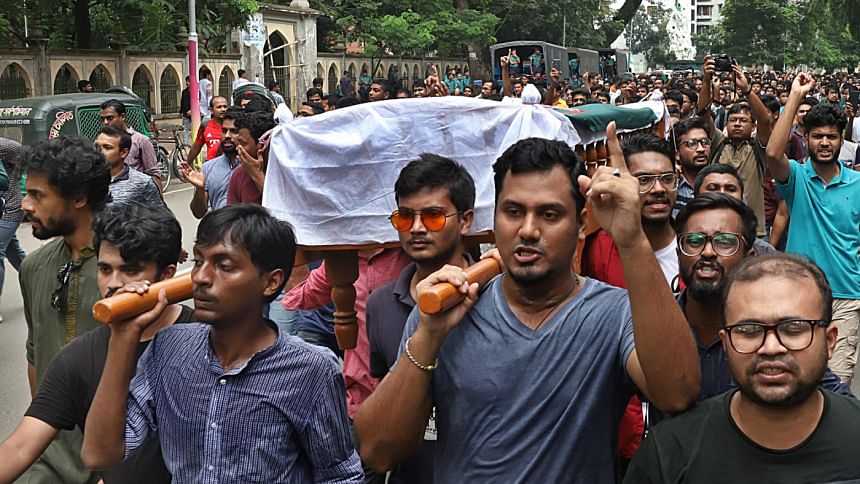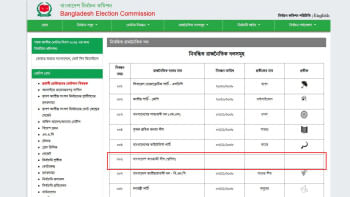Abrar murder and campus violence

Abrar Fahad was made to pay the ultimate penalty for sharing his thoughts. In a Facebook update posted on the eve of his brutal killing Abrar critiqued some of the recently concluded agreements between Bangladesh and India on the use of Mongla port, water sharing and gas export. In doing so he was merely exercising his constitutional right to express his opinion. Little did Abrar realise it would be his last communication with his FB friends. Little did this brilliant student know that his views and concerns on the issue were too unpalatable for the quarters that be, and little did he know that the posting would rattle a powerful section who has little respect for tolerance of differing opinions, let alone dissenting ones.
Within a few hours of posting, Abrar was summoned by the leaders of the Buet wing of Bangladesh Chhatra League (BCL), an affiliate of the ruling party. BCL leaders reportedly took away his cell phone, checked his Facebook and messenger, and started "questioning" him over his alleged involvement with Shibir, the student front of Jamaat-e-Islami. He was brutally tortured during the interrogation and subsequently succumbed to his injuries. At night, on receiving information, a contingent of police from Chawkbazar police station went to the spot. They were made to wait for some time at the reception area by the general secretary of Buet BCL. Police officials admitted that the team "was not allowed to enter" to rescue the victim right away after their arrival.
The bruises on his body spoke of the cruelty that he endured in his captors' hands. A CCTV footage that had gone viral showed Abrar being carried by three youths with seven others following them. Later that evening, 11 leaders and activists of the Buet BCL unit were expelled by the student body for their involvement with what was noted as an "unfortunate" incident.
Abrar's killing has stunned the nation. The grief-stricken mother of the deceased has warned against any effort to console her and demanded her son be brought back alive. The death has raged a firestorm on campuses across the country. A number of political, social and cultural organisations, human rights activists and student bodies have condemned the savage killing. Demands to arrest the killers and make campuses free of violence are getting louder by the day. The likelihood of yet another round of youth protest (a la' quota abolition and road safety movements) has driven the authorities to act quickly. Till October 8, law enforcement agencies had arrested 13 persons in connection with the killing.
The secretary of the ruling Awami League (AL) has promised his government's firm organisational and administrative stand "against any criminal activities regardless of the perpetrators' affiliation". He claimed that the prompt arrest and expulsion of about a dozen Buet BCL activists is a testimony of that commitment. He further stated that during this government's tenure, nobody was spared for their misdeeds and "BCL's good accomplishments of the past cannot be tarnished by some individuals".
The AL secretary is gravely mistaken if he wants the nation to believe that the dastardly murder at Buet on October 6 evening was the act of a few errant student activists, a symptom that can be fixed by political diktat. He is way off the mark on the claims about the government's action and BCL's image. Citizens weary of political violence well remember umpteen number of killings such as those of Moyeen Hossain Raju (DU, 1992), Sabequn Nahar Sony (Buet, 2002), Zubair Ahmed (JU, 2012) and Diaz Irfan Chowdhury (CU, 2016), the well publicised murder of Twaki and hundreds of cases of involuntary disappearances and alleged extra-judicial killings that remain pending for years because of mysterious reasons. The ruling party leaders need to come to terms with the fact that the image of the BCL based on glorious achievements of the past is being quickly consumed by the fire of unrestrained acts of violence, corruption and highhandedness. "Enough is enough" is the dominant mood of the common folks on the streets.
There is an urgent need for the high ups in the ruling party and administration to acknowledge that the butchery demonstrated in the Abrar case is only symptomatic of the reckless use of muscle power by BCL, backed by political patronage that is near pervasive across the campuses of public universities. And this situation must change.
Details are emerging about the systemic nature of torture on Buet campus perpetrated by BCL activists. Room 2011, located in the first floor of Sher-e Bangla Hall of Buet, has been termed by the students to be "a torture cell and party hub". It is in this room where Fahad was grievously bodily harmed by BCL activists wielding cricket stumps and bamboo sticks and died of "internal bleeding and excessive pain", according to the doctors conducting his autopsy. Buet students have claimed to have found empty bottles of liquor, knives and cricket stumps in the room. Quoting some of them who wished not to be named, press reports inform that Room 2011 was a meeting place for Awami League and BCL activists and was the site for regular parties. Despite it being a nuisance to other residents, no one, including those in the hall administration and proctor's office, dared to take action against those responsible. "The room was treated as a political room of Chhatra League. Students were picked up from the campus and tortured here," a Chhatra League leader wishing anonymity reportedly told The Daily Star. His statement was corroborated by an assistant provost of a Buet hall who stated that BCL had rooms, known to be torture cells, in all halls of the university. This culture of designated rooms for BCL "has returned in the last five years…It is their [the BCL] domain and no one else is allowed there," he said. In 2018, BCL members branded another student Daiyan Nafis Prodhan as Shibir activist and roughed him up before handing him over to the police. No one took them to task for their acts of unlawful detention and torture of a fellow student.
During the quota movement, the issue of physical and mental abuse of general students in the Gono Rooms (aka Common Rooms) by stewards of the student wing of the ruling party was a much talked about phenomenon. In those rooms, students are forced to greet boro bhais (senior BCL leaders), perform various tasks at their command and whims including sing, dance and recite dirty poems and attend meetings hastily called at odd hours (sometime at 2 am in the morning). They are also forced to offer senior leaders "protocol" when they encounter them anywhere on campus and join rallies. Those disobeying orders are physically punished, verbally abused or forced out of the dormitories. Abolition of the Gono Room practice was one of the key demands of the university students. Both the government and the university administrations promised to bring an end to the practice. Years have passed by, the abuse of general students in Gono Rooms continues unabated.
Abrar Fahad is not the victim of the acts of a bunch of unruly student activists. He has been the casualty of campus politics that is vitiated by intolerance and violence that are the hallmarks of current day national politics. Instead of granting student organisations autonomy to run their affairs and making the concerns of students as their priorities, instead of nurturing young leaders by instilling values of mutual respect, tolerance and plurality of opinion, the myopic political leadership across the party spectrum finds it convenient and opportune to retain control over campuses for their own vested interest. It does so through harbouring their very own apparatchiks, granting them impunity. As long as this senseless phenomenon persists, students like Abrar will continue to shed blood on campus.
CR Abrar is an academic and rights worker.

 For all latest news, follow The Daily Star's Google News channel.
For all latest news, follow The Daily Star's Google News channel. 



Comments